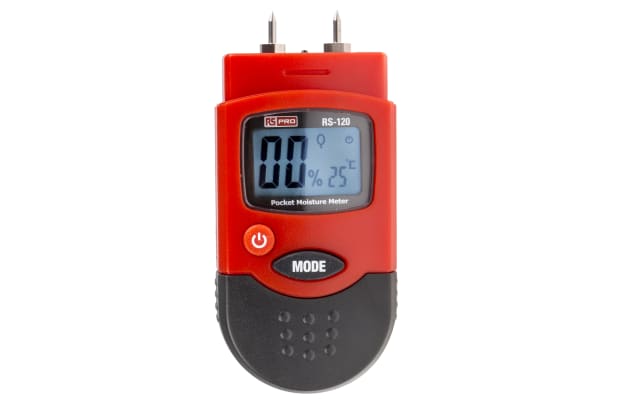The Ultimate Overview to Moisture Meters: A Comprehensive Overview and Just How They Can Save You Money
In the world of building maintenance, construction, and numerous markets, the relevance of properly determining dampness degrees can not be overstated. Wetness meters offer as vital tools in spotting and checking moisture material in products, assisting in avoiding pricey problems and guaranteeing the top quality of items. Understanding the nuances of various kinds of wetness meters, their applications, and the possible cost-saving benefits they offer can be a game-changer for companies and experts alike. Discovering how these gadgets can not just simplify processes yet likewise add to economic savings is a trip worth starting.
Sorts Of Moisture Meters
One usual type is the pin-type wetness meter, which determines the electric resistance in between two pins inserted into a material. Pinless moisture meters, on the other hand, use electromagnetic sensor plates to scan a bigger location without triggering damages to the product's surface area.
Infrared moisture meters determine the thermal residential properties of a material to establish its dampness content non-invasively, making them valuable for applications where pin or pinless meters might not be appropriate. Understanding the various kinds of wetness meters offered can help sectors pick the most proper device for their specific dampness measurement demands.

Benefits of Using Moisture Meters

Furthermore, utilizing moisture meters can cause raised energy performance. By identifying areas with high moisture levels, such as leaks or poor insulation, modifications can be made to enhance power conservation and lower utility expenses. In agricultural settings, moisture meters play a critical duty in enhancing plant yields by allowing farmers to keep an eye on dirt wetness degrees and make educated watering decisions. On the whole, the advantages of using dampness meters span throughout various industries, offering cost-efficient options and advertising far better quality assurance methods.
Just How to Pick the Right Moisture Meter
Picking the ideal moisture meter entails considering crucial elements such as material compatibility, measurement array, and calibration precision. When choosing a wetness meter, it's essential to make certain that the meter is appropriate for the particular material you will certainly be screening. Different materials have varying electrical residential or commercial properties that can impact wetness analyses, so selecting a meter developed for your material is crucial for accurate outcomes. In addition, think about the dimension series of the dampness meter. Make certain that the meter can identify moisture levels within the variety required for your applications. Calibration accuracy is another important aspect to bear in mind (Moisture Meter). Go with a dampness meter with dependable calibration to guarantee regular and precise analyses. Some meters might need periodic calibration changes, so comprehending the calibration process is important. By carefully examining these aspects, you can select a moisture meter that meets your needs and provides exact moisture measurements for your jobs.
Correct Strategies for Moisture Meter Usage
To guarantee precise wetness analyses and take full advantage of the performance of a wetness meter, using correct strategies is necessary. When utilizing a pin-type moisture meter, put the pins or probes right into the product being examined till they make full call. Make sure the pins are perpendicular to the surface area to obtain the most exact reading. For pinless wetness meters, hold the tool flat versus the material and relocate it gradually to cover the whole location for a typical reading. It's important to adjust the moisture meter according to the material being anonymous evaluated to enhance accuracy. Take numerous readings throughout the surface area and average them out for an extra trustworthy result. In addition, ensure that the material being checked is adapted to the environment to stop skewed readings. Normal maintenance of the moisture meter, such as cleaning up the pins or sensor, is also essential to ensure regular and accurate analyses. By following these correct techniques, users can count on their moisture meter to provide credible moisture levels, helping in preventing expensive damages or making certain high quality in various applications.

Price Financial Savings With Moisture Meter Applications
Just how can the critical usage of wetness meters lead to significant expense savings throughout numerous industries? In the agriculture sector, wetness meters aid in figuring out the ideal time for harvesting crops, avoiding over-drying or excess moisture that can affect the last item's high quality.

Additionally, in the food processing market, moisture meters are essential for keeping track of item top quality and making sure compliance with safety and security laws. By precisely gauging wetness material in foodstuff, suppliers can protect against putridity, preserve quality, and decrease waste, resulting in substantial expense savings. Overall, the calculated application of wetness meters is a useful financial investment that can cause substantial expense decreases and improved efficiency across different sectors.
Verdict
Finally, wetness meters are useful devices you can try this out for measuring and finding moisture degrees in numerous products. By making use of the appropriate moisture find this meter and complying with proper techniques, customers can efficiently avoid costly problems caused by excess dampness. Investing in a top quality dampness meter can result in considerable price financial savings over time by recognizing possible concerns at an early stage and allowing timely removal. Inevitably, moisture meters are essential instruments for maintaining the integrity and longevity of products and frameworks.
Wetness meters offer as crucial devices in identifying and keeping an eye on moisture web content in materials, assisting in protecting against pricey problems and ensuring the top quality of products. Infrared wetness meters gauge the thermal homes of a product to establish its moisture content non-invasively, making them valuable for applications where pin or pinless meters may not be appropriate.Dampness meters use very useful advantages in accurately analyzing and checking wetness degrees in diverse products and settings. In farming settings, moisture meters play an important duty in optimizing crop returns by allowing farmers to keep track of soil dampness levels and make informed watering decisions.In final thought, wetness meters are important tools for gauging and detecting moisture degrees in numerous products.